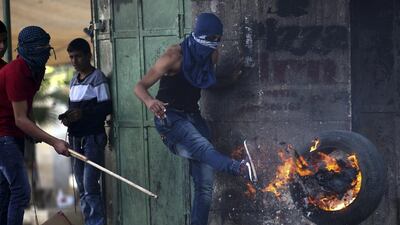Since the Arab Spring, social media has been championed as a platform for societal change in the region. Western audiences embraced social media as a way of obtaining information about events as they happened. People clicked on link after link to get the latest information from the ground.
For companies like Twitter and Facebook, the Arab Spring was great for business. But did social media bolster the Arab Spring or change long-standing opinions about the region? Can it change the nature of the Israeli-Palestinian conflict? The short answer is no.
Look at the numbers. In 2011, at the start of the Egyptian revolution, Facebook had six million users in a country of more than 80 million people. At the time, according to the 2013 Arab Social Media Report, produced by the Dubai School of Government’s Governance and Innovation Programme, there were only 130,000 Twitter users in Egypt. While the numbers grew over the course of the uprisings, the revolutions in Egypt, Libya, and Tunisia were primarily driven by people and traditional media rather than by what was happening online.
Attention is now turning to the uptick in violence in Israel and Palestine. In the West Bank, clashes over the last month between Israeli soldiers and Palestinian protesters have resulted in thousands of Palestinian injuries and 44 deaths. Palestinians, mostly from East Jerusalem, have stabbed and run over Israelis at random. Seven Israelis have been killed in such attacks. The Israeli military has imposed curfews and built roadblocks throughout Jerusalem.
______________________________________________________________
Read more about the Israeli-Palestinian conflict:
■ Masked soldiers and mass division will define the next intifada
■ In Jerusalem, justice is rarely served equally
______________________________________________________________
Unsurprisingly, many people are turning to social media for news and to debate what is happening.
At the same time, some observers have pointed to the high usage of social media platforms in Palestine. According to the Arab Social Media Report, Facebook has a 25 per cent penetration rate in the West Bank and Gaza (compared to a region-wide rate of 21.5 per cent) and it is this fact, coupled with the young age of many protesters, that leads to the conclusion that Palestinians are using social media to mobilise a third intifada.
In reality, the Palestinians remain without a unified leadership and clearly defined goals, both of which were core aspects of previous intifadas. Additionally, Palestinians have been using Facebook and Twitter to share information about protests since the platforms were invented.
What social media is doing is rewarding the angry on both sides by providing an online echo chamber. The Israeli-Palestinian conflict has always inspired loud, emotional and extreme viewpoints and at a time of heightened tension such as this, all of these negative traits are amplified. Social media, which thrives on getting people worked up for the simple reason that angry people click on stories and engage, provides a new and more dramatic avenue for this spirited but fruitless debate. This type of bickering will certainly not solve the problems. Social media encourages aggressive discourse. The louder one is on Twitter, for example, the more followers and attention one receives. The more dramatic the update on Facebook, the more “likes” it will get.
Given the brevity of Twitter and its inherent commodification of discourse, deep discussion is discouraged. As such, social media provides the illusion of empowering users when in fact it merely entrenches their views, silos them with like-minded people and encourages rude exchanges with adversaries. The American novelist Jonathan Franzen, known for his critical views on the internet, has called Twitter the “ultimate irresponsible medium” for these reasons.
There are some benefits that can come from social media engagement beyond bombastic Twitter fights. Before the world was consumed with the Arab Spring, Palestinians were filming regular non-violent protests against the Israeli separation wall in the West Bank and sharing them on Facebook, Twitter and YouTube with the aim of challenging the Israeli occupation. Seeing a video of men, women and children peacefully approach a line of soldiers who then fire tear gas directly at them challenged the security line that Israel has spun for decades.
Israel has invested lavishly in efforts to portray the conflict as one fought between two relative equals who are striving for peace and security. This is because the Israeli-Palestinian conflict is rooted in the deprivation of rights of the native inhabitants of Palestine. Sharing snippets of daily life in the West Bank and Gaza Strip on social media platforms challenges the dominant western description of the conflict that puts the Palestinians as the aggressors.
Let’s also not confuse the reach of social media with the pitiful quality of western coverage of the Israeli-Palestinian conflict. The western media have done a poor job of covering the conflict and have routinely fallen back on the Israeli narrative of security in describing the news. As such, social media platforms like Twitter have evolved into quasi-media watchdogs. If a newspaper runs a clearly biased or bogus report from Jerusalem, pundits often take to Twitter to “fact check” the work. During the last Gaza war, images of destruction and the dead were often released first on social media, thus upending the traditional way the international community receives news.
Never before have so many people had such a view on how the press operates on the ground. But highlighting life under occupation and drawing attention to poor reporting alone will not solve the conflict. It will be through Palestinian unity, clear leadership and outside pressure on Israel that the situation on the ground will change. In the meantime, social media will remain the best place for misinformed people to express their anger about the events on the ground.
jdana@thenational.ae
On Twitter: @ibnezra

